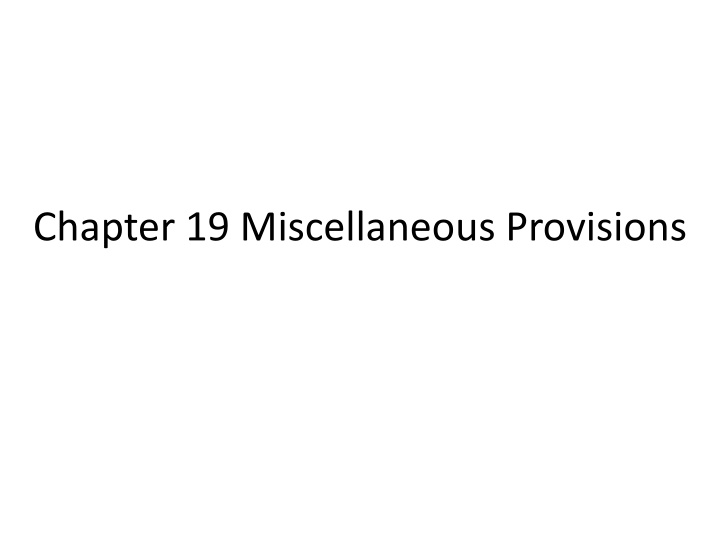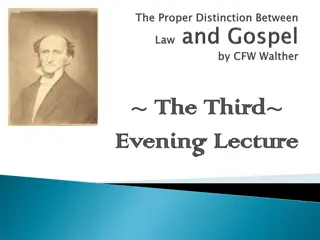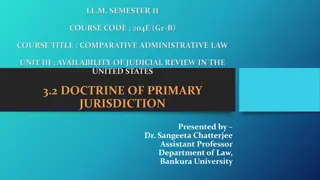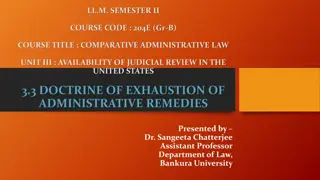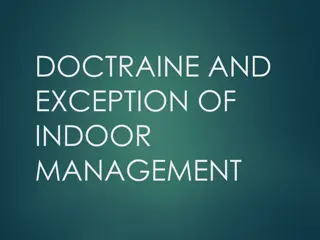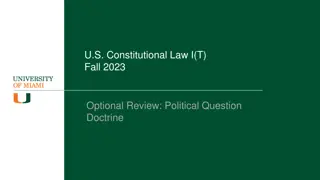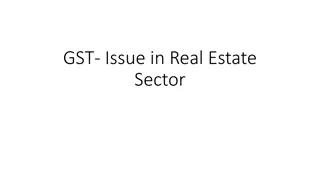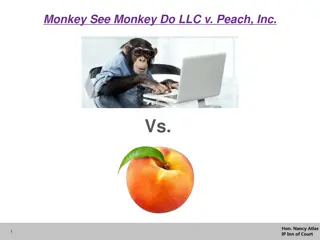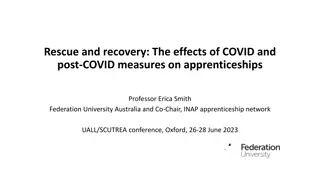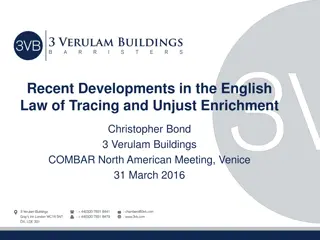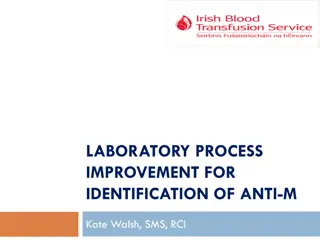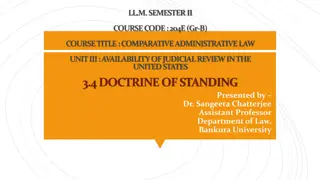Doctrine of Unjust Enrichment and Anti-Profiteering Provisions
The concept of unjust enrichment explains the equitable principles behind benefiting at someone else's expense. Explore exceptions to this principle and how anti-profiteering works under GST regime. Learn about reporting to the Anti-Profiteering Authority and the process involved in investigating illegal profiteering activities.
Download Presentation

Please find below an Image/Link to download the presentation.
The content on the website is provided AS IS for your information and personal use only. It may not be sold, licensed, or shared on other websites without obtaining consent from the author.If you encounter any issues during the download, it is possible that the publisher has removed the file from their server.
You are allowed to download the files provided on this website for personal or commercial use, subject to the condition that they are used lawfully. All files are the property of their respective owners.
The content on the website is provided AS IS for your information and personal use only. It may not be sold, licensed, or shared on other websites without obtaining consent from the author.
E N D
Presentation Transcript
Doctrine of unjust enrichment No one should be benefited at another s expenses. 'Unjust enrichment' means retention of a benefit by a person that is unjust or inequitable. 'Unjust enrichment' occurs when a person retains money or benefit which belongs to someone else in justice, equity and good conscience. The 'doctrine of unjust enrichment', therefore, is that no person can be allowed to enrich inequitably at the expense of another. A right of recovery under the 'doctrine of unjust enrichment' arises where retention of a benefit is considered contrary to justice or against equity.
Exceptions to the principal of unjust enrichment The principle of unjust enrichment would be applicable in all cases of refund except in the following cases: - 1. Refund of tax paid on zero-rated supplies of goods or services or both or on inputs or input services used in making such zero- rated supplies 2. Unutilized input tax credit in respect of (i) zero rated supplies made without payment of tax or, (ii) where the credit has accumulated on account of rate of tax on inputs being higher than the rate of tax on output supplies 3. refund of tax paid on a supply which is not provided, either wholly or partially, and for which invoice has not been issued; 4. refund of tax in pursuance of Section 77 of CGST/SGST Act i.e. tax wrongfully collected and paid to Central Government or State Government 5. if the incidence of tax or interest paid has not been passed on to any other person; 6. such other class of persons who has borne the incidence of tax as the Government may notify.
Anti-profiteering Any reduction in GST rate or benefit of input tax credit should be passed on to the end consumer and not retained by the business. This is the basis of anti- profiteering provisions under GST. Under anti- profiteering provisions, its illegal for a business to not pass on benefits of GST rate benefits to the end consumer and thereby indulging in illegal profiteering. Who regulates anti-profiteering under GST? The Government has created the National Anti- Profiteering Authority to find and take action against taxable registered persons indulging in illegal profiteering. The National Anti-Profiteering Authority has the powers to determine the methodology and procedure for determining as to whether a taxable person is indulging in illegal profiteering.
Reporting to Anti-Profiteering Authority Any interested party who has information to believe a taxable person in engaging in illegal profiteering from GST can refer the matter to the local screening committee. The matter will then be examined by a State level Screening Committee constituted by the State Governments consisting of officers of the State Government. If the screening committee determines that the matter has merit, it would be forwarded with recommendations to the Standing Committee on Anti-Profiteering, which consists of Officers of both the State Government and Central Government. If the Standing Committee is satisfied that there is evidence to show that the taxable person has engaged in illegal profiteering, then the matter will be referred to the Director General of Safeguards for a detailed investigation.
E-Commerce Electronic Commerce has been defined in Sec. 2(44) of the CGST Act, 2017 to mean the supply of goods or services or both, including digital products over digital or electronic network. An ecommerce operator is any online business that operates using a marketplace model. Under the marketplace model, an organization sets up an online portal where several small suppliers put up their products for sale. The organization that runs the portal collects payments, takes a percentage as a convenience fee, and sends the rest of the payment to the suppliers. You might already know some of the big players in this market, like Flipkart, Amazon, and Snapdeal.
Business models for E-Commerce The model of doing business in order to generate revenue and also for its survival is regards as a business model. E-Commerce is more than a technology only. It should be treated as a business model which is built around the application of information and communication technologies to cover any aspect of the value chain for products and services. On account of technological challenges and rising competition, the e-commerce operators are required to innovate and adopt new methods. It has led to evolution of many business models. Some of these models as follows:
Business models for E-Commerce Concept with Example 1. Principal to principal Under this model, the vendor is the vendor is the site owner. The vendor directly deals with the customers through the web site. For e.g. Urban ladder is a company engaged in living room designs, bedroom designs, modular kitchens, modular wardrobes, expert home consultation, etc. The co. Has its own web site www.urbanladder.com, through which e-commerce takes place. 2. Principal to agents Under this model, the site owner is not the vendor rather he acts as an agent. The customer approaches the vendor through the web site of the ECO. The famous e.g. Are Flipkart, Snapdeal, Amazon, etc. 3. Aggregator The aggregator is a person, who owns and manages a web- based software application, and by means of the application and a communication device, enables a potential customer to connect with persons providing service of a particular kind under the brand name or trade name of the aggregator. The e.g. Are Trivago.com, Ola Cabs, Uber etc.
Levy of GST on E-Commerce Transactions of CGST Act & section 5(5) of IGST Act. The central govt. Is empowered to specify the categories of services on which tax shall be paid by the electronic commerce operator if such services are supplied through it. Therefore, if any service is specified by the govt., the tax on such service shall be paid by the ECO. Further the ECO shall be treated as the person liable to pay tax and all the co s need to be done by him. The govt. Has notified foll. Categories of services, supplied through ECO, for the purpose of E-Commerce.
a) Services by way of transportation of passengers by a radio-taxi, motor cab, maxi cab and motor cycle. b) Services by way of providing accommodation in hotels, inns, guest houses, clubs, campsites or other commercial places meant for residential or lodging purposes, except where the person supplying such service through ECO is liable for registration under GST Law. c) Services by way of house-keeping, such as plumbing, carpeting etc., except where the person supplying such service through ECO is liable for registration under GST Law.
Levy of GST on E-Commerce Transactions There are two separate provisions under the CGAT Act by which an E-Commerce operator is liable to pay tax, which are as follows: a) When the ECO is made the taxable person:- if the services supplied through ECO are notified by the govt., then the ECO has to pay GST on such services as the person liable to pay tax; b) By mechanism of tax collection at source:- if the services have not been notified of IGST Act, the E- Commerce operator is still liable to collect tax at source for the value of taxable supplies made through it by other suppliers.
